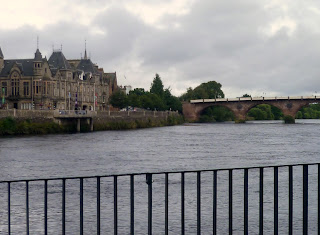Our road trip was rather whistle stop in
nature and we had to pick and choose what we were going to see. However that leaves loads more to do next
time. I’d just like to mention that my
RHS membership card was beneficial in keeping down entrance cost to gardens.
First stop Dunblane with its bitter sweet
recent history.
We looked round the well set out museum
and saw all kinds of artefacts from battlefields, farms and homes.

This quiet town will always be remembered for a most tragic event. A gunman went on a shooting spree at the local primary school
killing 16 children and their teacher.
One of the surviving pupils became one of Dunblane’s famous sons, the
tennis player Andy Murray.
 |
| The gold post box and bench in honour of Any Murray |
 |
| A statue in memory of those who perished in the school massacre |
Although we
saw tennis courts, apparently Judy Murray has put in a planning application for
a tennis and golf centre.
After staying the night
in the city of Perth with its lovely buildings, we visited some well stocked,
public gardens by the River Tay.
 |
| Bridge over the River Tay |
 |
| Rodney Gardens by the River Tay, Perth |
Then it was off to one of
Scotland's most important stately homes,Scone Palace (here Scone rhymes
with spoon)
which has an exciting and colourful history.
The guides were excellent and really brought the rooms and pieces to
life. The dining room was set out as it would have been for the visit of the young Queen Victoria. It took them two years to prepare for her visit! The extensive grounds, where peacocks strutted about, were also enjoyable.

| |||
| The famous Stone of Scone, although there are doubts about its authenticity. |
En route to our next
overnight stop, we stopped at Pitlochry on the banks of the River Tummel where,
next to the Festival Playhouse, is the Explorers Garden which is planted on a
hillside.
The 6 acre garden was rather back-endish
but had wonderful woodland gardens in which we spotted red squirrels. This tranquil
place is divided into geographical zones where plants brought back by Scottish
plant hunters are grown. There are also interesting sculptures and
architectural features. At the top of the garden,
the David Douglas Pavilion, built from a
variety of different woods, housed an
exhibition
of photographs by Julia Cordon taken during her plant hunting
expedition in North America. The pavilion allows you to appreciate the trees and look
down at the burn (stream) below.












.jpg)

Lovely photos. That statue... so beautiful and so fitting.
ReplyDelete